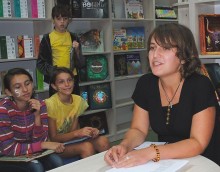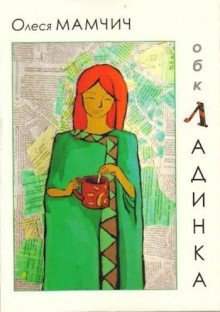Olesia Mamchych is not only a translator and a Ukrainian poetess who writes for adults and children, but also an active participant of the Maidan. Her husband Oleksandr Kravtsov is an Automaidan activist, who together with others was under investigation and faced from 8 to 15 years of imprisonment for his activity during the stormy events. Recently she presented her new collection of poetry. The Day interviewed Olesia about her creative work, prospects of Ukrainian society, politics, and culture, of course.
Olesia, your new book is entitled Obkladynka (A Cover)…
“This book includes the texts I wrote in 2005-08. I have compiled it long ago and tried to publish, but I have gotten an opportunity to do this only recently. For the most part I wrote the poems it includes outdoors. We have a summer cottage near Chernihiv, near the Desna River – in a picturesque locality, which is called Ladynka. That is why this petty ironic context is added to the title of the book, Obkladynka (A Cover). Those who know my life better may read it like Ladynka. Besides I entitled it this way because I planned to make a multimedia project as well. I wanted to attach to it video and audio recordings of poems. I have made the audio recordings, which will be later available for free on Avtur [a web catalog of modern Ukrainian literature. – Author]. But I have failed to realize the project with video shooting, because I could not find professionals who could have implemented it.”
What do you write these days?
“It turned out that writers during Maidan either did not write anything, or, if they even did, it was about the present-day events. The same thing happened to me. I have a great desire to artistically ponder the new experience we received, therefore I often write poems about this, I have even wrote a fairytale. I am also thinking about the possibility to create something more fundamental – prose or even memoirs. Of course, poetry is the simplest way to express the unspoken experience, because it is emotional, like everything that is going on around us. Poems sometimes say more than you plan to say and create a kind of double bottom on their own.
“At the moment the Smoloskyp Publishing House is preparing my book for publishing. It will include the newest texts. The collection is called Sun Goes on a Maternity Leave. I wrote it during my maternity leave with my second kid. Its thematic is versatile; in particular, there are several texts about Maidan. Currently I am at the new stage, pondering all the topics that interest me: loneliness, death, love, and city. When you reach certain age, you ponder each of them on a new level.”
Today we can hear that an intellectual revolution has taken place in Ukraine. Do you agree?
“In fact, the intellectual categories of society were the first to rise. Maidan included various kinds of people, but still artists were the leading part. I was very impressed by the powerful explosion of creative work: the slogans and their design. On the contrary, there was a huge abyss in the Antimaidan. They did not give rise to anything of their own, they did not rhyme any slogan, they could not even think of a title for their movement. Everything that was done on that side was a copy of twilight with gloomy paleness.
“The Book Arsenal was a good sign. Everyone says in unison that there were no such crowds of visitors in peaceful time. This time there were huge lines of people who wanted to buy books. Owing to this revolution, society started to move towards intellectualization. As an author, I have noticed the growth of importance of litterateurs: more people started to take interest in our opinion. Owing to Maidan, broad public had an opportunity to learn a whole range of new names, listen to good music, and read books. I was impressed how ‘zhlobist’ artists (artists against slobs and vulgarity), who started their movement even before the revolution, foresaw all of our problems, clearly described and diagnosed them. In a sense, the revolution was a response to the growing problem of vulgarity.
“Apart from the dark days, in the Maidan I saw a powerful light stream of self-organization of people. Today it is very easy to raise money for various things, in particular, products of culture. Money was found for Hromadske television and publishing of books. I lack words to say how much joy it gives to me.”
In your opinion, what can litterateurs do to unite western and eastern Ukraine?
“Clearly, the events that are currently taking place in the east are an acute crisis. I think if we did not have any economic problems, people would not have fallen so easily for the Russian propaganda. The society there is heterogeneous. It is good that there are people that bring cultural enlightenment to that region. For example, Serhii Zhadan always finds his audience there. We need to reinforce the cultural exchange. The artists should come and show our country as something close, new, and something that is developing. Then Ukraine in the east will be stronger. Time is working for us.
“I recall how I was recently returning in the evening, together with writers Petro Yatsenko and Halia Tkachuk, from Valentyn Sylvestrov’s concert that took place in the Book Arsenal. I suddenly realized that we were going and talking about music, no more afraid of thugs in the Square of Glory. We could not dream about this before. I really hope that a moment will come when we will go across Donetsk, for example, speak about poetry and we won’t be afraid of any ‘green’ men, or any other people, and cannonry won’t be aimed at us from behind the border.”
What is the situation with your husband? Has the criminal case been closed?
“The case was closed on February 25. But then we received some appeals. The press responded to my Facebook post, and Prosecutor’s Office responded to the press. They immediately started to assure us that they were doing this for our good. They explained that last time the case had been closed for an article which in the future could become a reason for new complaints, and this time they were going to close based on the lack of corpus delicti, and no one would be ever able to find any fault with. Hopefully, it will be so. Finally, the response came to the statement Sashko submitted 1.5 months ago – they started to investigate the illegal actions of Berkut. But, unfortunately, the progress in this case is very sluggish. When my husband was in Poland, a policeman suddenly came to our apartment to check his home arrest. Then I understood that the system was ‘buzzing.’ It is based on wasting the time of people who get in there. When Sashko’s case was closed on February 25, the lawyer delivered a speech, the prosecutor agreed, and the judge said she was going to the room for consultation and stayed there for four hours. This is a remainder of the Soviet-type bureaucracy.”
Do you believe that there will be changes?
“I think the changes won’t be quick, but, most importantly, the changes have begun, and it is important in what direction we are going. There was Yanukovych who wanted to tighten the screws, and now the society has stopped, hitting its forehead. And if it continues to go towards changes, there will be prospect. In this revolution we have achieved the prospect which they wanted to take away from us.”
What prospects do you see in your sphere?
“At the moment Ukrainian culture is experiencing a kind of renaissance, which is similar to the process that took place in the early 20th century. Then it was ‘mowed’; hopefully, this thing won’t repeat today. There will be everything, but we need time. All the more so, culture is living a life of its own – it should not be impeded. If they don’t touch us, and maybe help us, there will be development. Art is little connected with bureaucratic structures.”
In your opinion, what kind of support should it be?
“In the West, for example, the state envisages a tax for support of culture, makes efforts to promote its country abroad. The Goethe Institute and the Polish Institute are operating all over the world. Of course, Ukrainian artists are trying to break through even without this. Owing to international connections and spread of the Internet all over the world, everyone can try to go to some festival and present its artistic work. But there is a need for governmental support, specifically in what concerns the funding of such trips. At the moment we are enjoying the attention the world is paying to us – there is demand for Ukraine and its culture. But in a while they will switch their attention to something else. To get big bonuses we need to work.”
What conclusions have you made for yourself after Maidan?
“We have brought various experiences from Maidan. This is like a multilayer cake you ate hurriedly and haven’t savored each of its components. During the next few years we will seriously ponder everything we have learned about ourselves. About mutual assistance, fear, death, and real human relationships. In many people who are dear to me I saw courage and bravery, which they could not show in peaceful time. On the tenth year of marriage I understood that my husband is not afraid of anything (laughing). There is no doubt that we have changed. After these events the percentage of people who are ready to work for Ukraine and treat their civic duties with awareness has considerably increased. Such situations provide a sudden leap. We have experienced it and if we take hold and grow mature, we will stand the chance to break away and finish with this Soviet-type ‘bog’ in ourselves. Every Lenin statue that fell brings us closer to Paris.”








